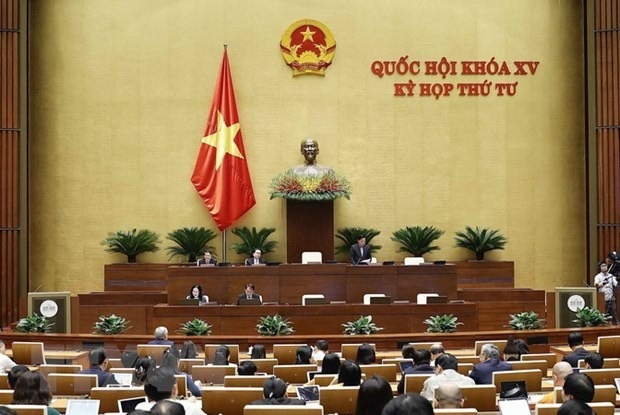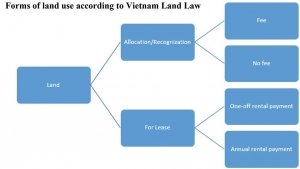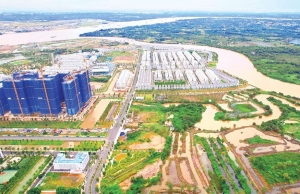Valuation: A tough issue for amending the Land Law
On November 14, the National Assembly of Vietnam considered amending the Land Law. To institutionalise the objective of Resolution 18-NQ/TW on continuing to remodel, strengthen institutions and policies, and enhance the efficacy and efficiency of land management and use, the new aspect of this revision is the elimination of the land price band and the transition to determining the price based on the current market rate.
Currently, the Land Law 2013 has a favourable adjustment to the regulation on land value, with particular emphasis on the regulation on specific land prices. Despite the encouraging indicators that the Land Law has brought to the subject of land value, there are still several issues and impediments.
According to Minister of Natural Resources and Environment Tran Hong Ha, land valuation may be accomplished by gathering data on land prices and using mathematical methods, statistical calculations, and other techniques to identify the outstanding land, the standard property plot, and the number of land parcels. This will address the present deficiencies.
 |
| Discussion session for the 15th National Assembly's 4th session. Photo: VNA |
According to Minister Ha, the market will be stabilised and the financial contributions of land users will be established if the issue of land value can be resolved. Valuing property at its asymptotic market price will help prevent loss, speculation, and price inflation.
The elimination of the land price bracket and the establishment of market pricing are seen as significant advancements around land management and usage, resulting in a fundamental shift in economic concerns pertaining to land policy and law. However, several National Assembly deputies argued that it is impossible to fix pricing based on the market.
National Assembly deputy Phan Thai Binh (Quang Nam province) said that the value of land in the central province soared in 2017 and 2018 before plummeting owing to the impact of the pandemic. "How do we evaluate the price?" questioned Binh.
In reality, the land price on the market this year may be high, but it will decrease in the next year before rising again the year after. Binh said that next year's valuations will not approach the market if they are greater than this year's.
| According to Article 129 of the proposed amended Land Law, the land valuation must adhere to the following principles: valuation based on the purpose of land use; valuation based on the land use term; consistency with the current land price in the market under normal conditions; strict compliance with the regulations, methods, order, and procedures for land valuation in accordance with the provisions of law; and ensuring the independence of professional expertise, fairness, and consistency. The proposed legislation delegates to the government the responsibility of specifying land pricing criteria and methodologies, the process of reviewing and regulating the compilation of land price lists, and particular land valuation. |
Binh stated that the draft should be more explicit on land value to balance the connection between the people, the government, and the business community. According to him, particular circumstances and criteria are required to achieve market-based pricing.
In the sphere of land management and usage, the elimination of the land price bracket and the establishment of market pricing are regarded as significant developments. In his report on the verification of the revisions to the Land Law, Vu Hong Thanh, Chairman of the National Assembly Economic Committee, advised that the government define more precisely "the market value of land use rights under normal circumstances."
Thanh also requested that the government establish land valuation methodologies and particular application instances to promote openness and transparency.
It is feasible to "use a variety of approaches for estimating and assessing land values," he added, but "the choice with the best results must be selected to avoid exceeding the budget."
According to a large number of domestic economists, abolishing the land price bracket may lead land prices to rise as compensation for site clearing increases, investment expenses rise, and poor people struggle to have access to land, particularly in determining the market value. These are concerns that must be properly addressed to create policies that are suitable, transparent, and practicable.
There are still a variety of issues with the setting of land values in several areas. Typically, a succession of land pricing and land price determination infractions occurs. In 2019, Ho Chi Minh City People's Committee made numerous mistakes in implementing the Thu Thiem New Urban Area project, authorising that the average cost of one square metre of residential and commercial land is more than $1,000 and has decreased by approximately 50 per cent compared to the land prices proposed by the local authorities previously.
In addition, when the city signed a build-transfer contract with investors to develop four main highways without a certificate of valuation, Ho Chi Minh City People's Committee did not approve the value of land use rights. This is not in conformity with the regulations of the 2012 Price Law and the 2013 Land Law, resulting in a substantial loss since the land usage fee was reduced by about $157 million compared to the value previously evaluated and authorised by Ho Chi Minh City People's Committee.
According to the 2013 Land Law, there are five main ways for estimating land prices: the direct comparison method, the extraction method, the income method, the residual method, and the land price adjustment coefficient method.
 | Advantages of amending Law on Land Land is the most valuable asset of each person, business, and country, and thus a major goal is to unleash the potential of land use. Le Net and Tran Thai Binh, lawyers at LNT & Partners, propose amendments to the current legislation regarding the land. |
 | More clarity urged for draft guidelines of new Land Law Although the draft amended Land Law is deemed to meet the requirements for Vietnam’s economic development, it remains unclear whether it can solve practical problems in land acquisition, speculation, and valuation. |
 | Revised land law may not clear up condotel conditions Although a draft revised Law on Land proposed by the Ministry of Natural Resources and Environment will not include condotels in its remit, experts still suggest the issue needs to be addressed to ensure clarity on differences in terms of business and regular accommodation. |
What the stars mean:
★ Poor ★ ★ Promising ★★★ Good ★★★★ Very good ★★★★★ Exceptional
Related Contents
Latest News
More News
- Construction firms poised for growth on public investment and capital market support (February 11, 2026 | 11:38)
- Mitsubishi acquires Thuan An 1 residential development from PDR (February 09, 2026 | 08:00)
- Frasers Property and GELEX Infrastructure propose new joint venture (February 07, 2026 | 15:00)
- Sun Group led consortium selected as investor for new urban area (February 06, 2026 | 15:20)
- Vietnam breaks into Top 10 countries and regions for LEED outside the US (February 05, 2026 | 17:56)
- Fairmont opens first Vietnam property in Hanoi (February 04, 2026 | 16:09)
- Real estate investment trusts pivotal for long-term success (February 02, 2026 | 11:09)
- Dong Nai experiences shifting expectations and new industrial cycle (January 28, 2026 | 09:00)
- An Phat 5 Industrial Park targets ESG-driven investors in Hai Phong (January 26, 2026 | 08:30)
- Decree opens incentives for green urban development (January 24, 2026 | 11:18)

 Tag:
Tag:


















 Mobile Version
Mobile Version